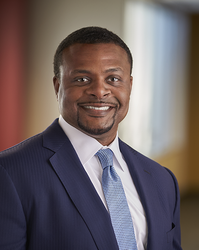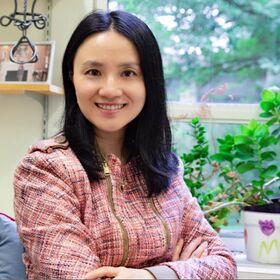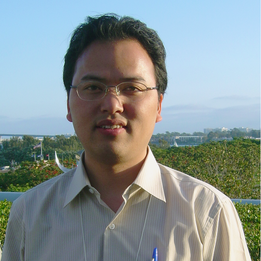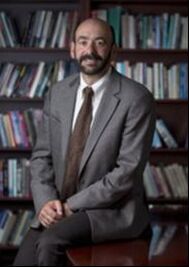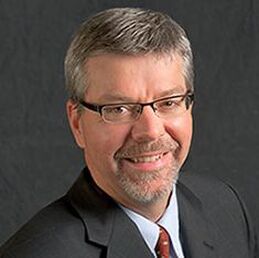In partnership with Educational Testing Service (ETS), the UCI School of Education is co-hosting this invitation-only convening of active panel and roundtable discussions with executive representation from high school districts, community college districts, nonprofits, policy think-tanks and industry. Goals include defining the types of 21st century competencies - such as critical thinking, collaborative problem solving and interpersonal communication - that are aligned with the goals of Orange County education providers and the needs of local employers.
This meeting will explore interest in a demonstration project that would serve as a national model of helping students to signal mastery of higher-order skills; providing opportunities for co-developing solutions for skills assessment and training; and addressing opportunities/challenges around preparing students to be competitive in the job market.
This meeting will explore interest in a demonstration project that would serve as a national model of helping students to signal mastery of higher-order skills; providing opportunities for co-developing solutions for skills assessment and training; and addressing opportunities/challenges around preparing students to be competitive in the job market.
Wednesday, February 5, 2020
9:00 a.m. - 2:00 p.m.
UCI University Research Park, 5301 California Avenue, Suite 120, Irvine, CA 92617 (map)
9:00 a.m. - 2:00 p.m.
UCI University Research Park, 5301 California Avenue, Suite 120, Irvine, CA 92617 (map)
Lunch provided
Business casual attire
Complimentary self-parking available
Questions? Please contact Sarah Steffen, Associate Director of Development: (949) 824-2741, [email protected]
Business casual attire
Complimentary self-parking available
Questions? Please contact Sarah Steffen, Associate Director of Development: (949) 824-2741, [email protected]
AGENDA
|
9:00 a.m.
|
Registration and Continental Breakfast
|
|
9:15 a.m. – 10:15 a.m.
|
Career Education and Employer Needs in Orange County
K12 District Leaders, Community College District leaders, Orange County Department of Education and Corporate Partners |
|
10:15 a.m. – 10:30 a.m.
|
Break
|
|
10:30 a.m. – 12:00 p.m.
|
Educational Testing Service Skills for the New Economy Initiative: Rationale, findings, capabilities and prototype
|
|
12:00 p.m. – 1:00 p.m.
|
Lunch
Keynote: Hans Johnson – Senior Fellow, Public Policy Institute of California and Thomas and Marilyn Sutton Chair in Higher Education Policy "Addressing Gaps in California Workforce Needs and Education" |
|
1:00 p.m. – 2:00 p.m.
|
Reconvene Measurement Development Discussion and Next Steps
Richard Arum and ETS Team |
MEET THE ETS PANEL
Lorenzo Esters
Dr. Lorenzo Esters is Executive Director for Higher Education Partnerships within the Global Education Division of ETS. In his role, he seeks to develop new partnerships with higher education institutions, businesses and corporations to advance the mission of ETS. He is currently leading the Skills for a New Economy Initiative at ETS, an effort that focuses on helping individuals signal mastery of skills necessary for the workforce of the future. Dr. Esters has provided effective thought leadership in creating college and career pathways for first-generation and low-income students and developing appropriate student academic support services. He previously served as Vice President for Philanthropy with Strada Education Network, Vice President for Student Success and Enrollment Management at Kentucky State University and Vice President for Access with the Association of Public and Land-grant Universities.
Lydia Liu
Dr. Lydia Liu is Senior Research Director of the Academic to Career (AtC) Research Center at ETS. AtC supports ETS research in higher education and workforce spaces. Lydia is an internationally recognized scholar in the assessment of critical competencies in higher education and workforce arenas. She was the recipient of the 2019 Robert Linn Memorial Lecture Award and the 2011 Jason Millman Promising Measurement Scholar Award by the National Council on Measurement in Education. Lydia holds a doctorate in Quantitative Methods and Evaluation from UC Berkeley.
|
Guangming Ling
Dr. Guangming Ling is a lead scientist of the Skills for a New Economy Initiative, and a senior research scientist in the Academic to Career Research Center, Educational Testing Service. Dr. Ling’s research focuses on assessment and training of core competencies, student learning outcomes assessments, and factors related to test validity, reliability, and fairness issues, covering a wide range of topics such as test mode effects, subscore reporting, test-taking motivation, computerized adaptive testing, and human- and machine-scoring of essay and speech responses. He has directed research projects related to a wide range of testing programs, including GRE, Major Field Tests (MFT), HEIghten, SAT, TOEFL iBT, TOEFL Junior, the PARCC assessments, and the National Board of Professional Teaching Standards (NBPTS). Dr. Ling holds a U.S. patent on the technology in relation to using an automated scoring system to improve scoring accuracy and efficiency of speaking responses in English. Dr. Ling has made more than 70 presentations at international and national conferences, including the International Meeting of the Psychometric Society (IMPS), National Council on Measurement in Education (NCME), American Educational Research Association (AERA), Language Testing Research Colloquium (LTRC), and American Psychological Association (APA). Dr. Ling has published over 30 papers in peer-reviewed journals such as Exceptional Children, Child Development, Educational Assessment, Language Testing, Assessing Writing, Language Assessment Quarterly, International Journal of Testing, and Journal of Education in Business. Dr. Ling holds a Ph. D. in psychometrics (quantitative psychology) from Fordham University.
Javarro Russell
Dr. Javarro Russell is the Sr. Strategy Director for Business Development at ETS. In his role, he focuses on consulting on measurement and assessment design issues in post-secondary education. His expertise is in assisting post-secondary education programs in identifying solutions to assessing and measuring student learning outcomes on their campuses. Dr. Russell also specializes in identifying effective ways of reporting assessment results to audiences with varying levels of technical and practical expertise in assessment and measurement. In his role for the ETS Skills for a New Economy initiative, he will be leading the design of solutions that bridge the education and workforce sectors by focusing on their needs for skill signaling.
|
ABOUT RICHARD ARUM
Dean and Professor, UCI School of Education
Richard Arum is dean and professor of the UCI School of Education. His research interests are focused on the legal and institutional
environments of schools, social stratification, digital education and formal organizations. He has studied stratification patterns
across tertiary systems, the transition between college and the labor market, and the quality of American higher education institutions.
His research on K12 education has analyzed student achievement gaps by race and class, school segregation and stratification, the
effects of legal and institutional environments, and the evolution of discipline in American schools. His research on educational
interventions is designed to identify policies and practices that could mitigate the relationship between social background,
disadvantaged neighborhood context and educational outcomes.
Arum is principal investigator on the Next Generation Undergraduate Success Measurement Project, supported by the Mellon Foundation.
The project is tracking UCI undergraduate students longitudinally, in an effort to improve our understanding of the value of college,
and promote evidence-based models of undergraduate student success.
Prior to his tenure as dean, Arum was chair of the Department of Sociology at New York University, senior fellow at the Bill & Melinda Gates Foundation, and Director of Education Research at the Social Science Research Council. He received a B.A. from Tufts University,
a M.Ed. from Harvard University Graduate School of Education, and his Ph.D. in Sociology from UC Berkeley.
environments of schools, social stratification, digital education and formal organizations. He has studied stratification patterns
across tertiary systems, the transition between college and the labor market, and the quality of American higher education institutions.
His research on K12 education has analyzed student achievement gaps by race and class, school segregation and stratification, the
effects of legal and institutional environments, and the evolution of discipline in American schools. His research on educational
interventions is designed to identify policies and practices that could mitigate the relationship between social background,
disadvantaged neighborhood context and educational outcomes.
Arum is principal investigator on the Next Generation Undergraduate Success Measurement Project, supported by the Mellon Foundation.
The project is tracking UCI undergraduate students longitudinally, in an effort to improve our understanding of the value of college,
and promote evidence-based models of undergraduate student success.
Prior to his tenure as dean, Arum was chair of the Department of Sociology at New York University, senior fellow at the Bill & Melinda Gates Foundation, and Director of Education Research at the Social Science Research Council. He received a B.A. from Tufts University,
a M.Ed. from Harvard University Graduate School of Education, and his Ph.D. in Sociology from UC Berkeley.
KEYNOTE SPEAKER
Hans Johnson
Senior Fellow, Public Policy Institute of California
Thomas and Marilyn Sutton Chair in Higher Education Policy
Hans Johnson is director of the PPIC Higher Education Center and a senior fellow at the Public Policy Institute of California, where he holds the Thomas and Marilyn Sutton Chair in Higher Education Policy. As center director, he works with a team of researchers to identify policies that
can make higher education policy more successful and sustainable. His own research focuses on improving college access and completion. He
frequently presents his work to policymakers and higher education officials, and he serves as a technical advisor to many organizations seeking to improve college graduation rates, address workforce needs, and engage in long-term capacity planning. His other areas of expertise include international and domestic migration, housing in California, and population projections. Previously, he served as research director at PPIC. Before joining PPIC, he worked as a demographer at the California Research Bureau and at the California Department of Finance. He holds a PhD in demography and a master’s degree in biostatistics from the University of California, Berkeley.
can make higher education policy more successful and sustainable. His own research focuses on improving college access and completion. He
frequently presents his work to policymakers and higher education officials, and he serves as a technical advisor to many organizations seeking to improve college graduation rates, address workforce needs, and engage in long-term capacity planning. His other areas of expertise include international and domestic migration, housing in California, and population projections. Previously, he served as research director at PPIC. Before joining PPIC, he worked as a demographer at the California Research Bureau and at the California Department of Finance. He holds a PhD in demography and a master’s degree in biostatistics from the University of California, Berkeley.

